
Alina’s journey: from Navapolatsk to New York via the Tbilisi European School
Alina Melnikava from Navapolatsk had already made the headlines in 2020, when her story was featured in the Belarusian media. Alina was at the Tbilisi European School, supported by the European Union, studying for the International Baccalaureate (IB).
Developed in 1968 in Switzerland, IB teaching is conducted in 156 countries. Alina was admitted to the School after finishing 10 grades in Navapolatsk. The selection took six months.
The second year of study was significantly affected by the pandemic and events in Belarus. In Georgia, there was a lockdown and children either continued through distance learning, or were put on self-isolation on arrival from Belarus.
After the summer holidays, the students convened again in August 2020. Alina says that she was offered to fly to Tbilisi on August 9, but she refused: “I left two weeks later: I wanted to see with my own eyes what was happening in Belarus.”
During the 2020-2021 academic year, most of the teaching was done online – whether students stayed on campus in Georgia or lived at home. At the same time, Alina was engaged in applying for university, with an eye to an art-related field of study:
“Sometime in June 2020, I chose to apply to New York University and began to get prepared in accordance with the admission criteria. In August, an application for early decision was opened, and until November I had time to collect documents, fill out everything and send it. An early decision implies that if the university’s decision is positive, one can retract. I realised that I wanted to study art – even in junior school, in Navapolatsk, I went to art school, and studied art in depth in Tbilisi. At New York University, I chose the collaborative arts programme at the Tisch School of the Arts. This specialty is at the intersection of drama, film production and media, musicology, photography, production and business.”
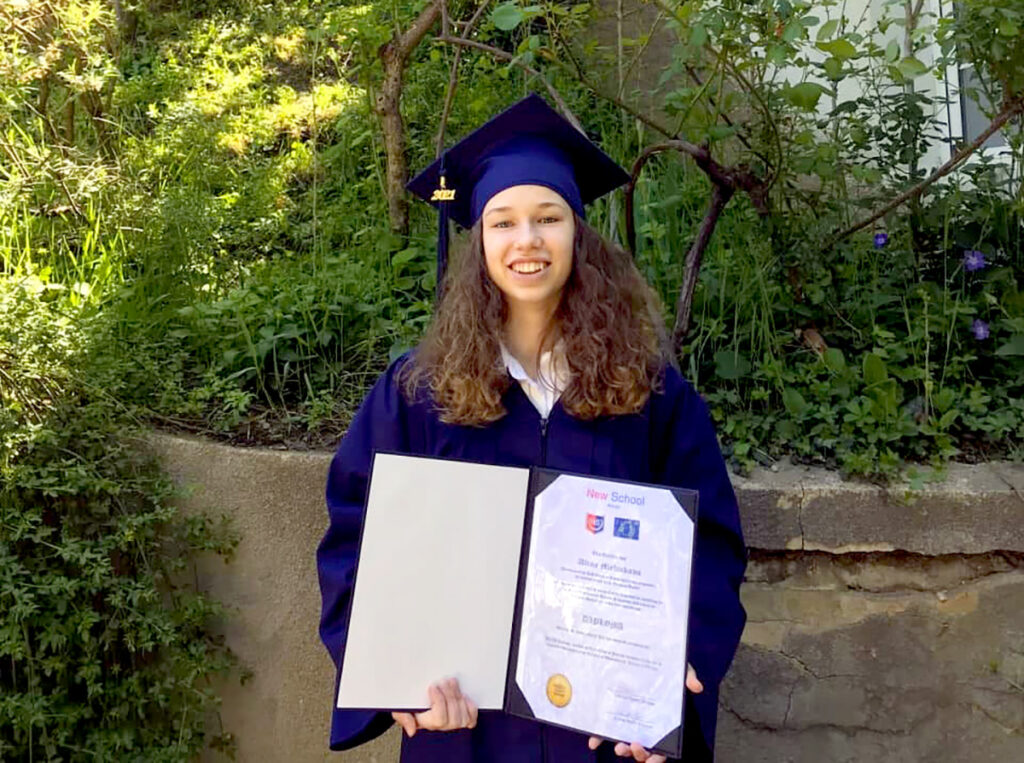 Alina Melnikava
Alina Melnikava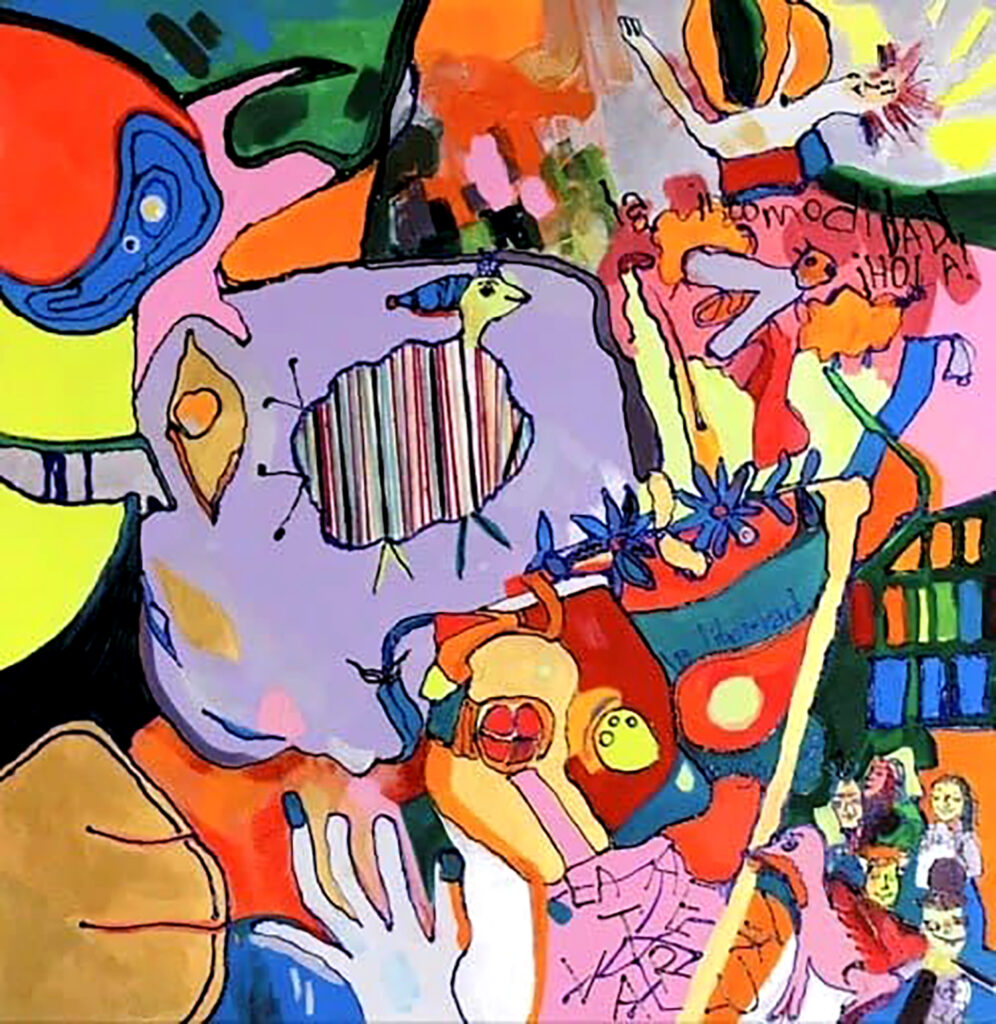 One of Alina’s artworks
One of Alina’s artworks
Alina emphasises that she was more attracted by the course of study than by New York City itself. She is not the kind of person who loves the city in absentia or learns about it online. Even after she was accepted, she says, there has been little time to get to know the city better.
NYU campuses are located in different parts of the city. Tisch School is directly on Broadway, Manhattan. This university is the alma mater of 38 Nobel laureates in various fields, 26 Pulitzer Prize winners and 22 Academy Award winners. Famous directors Woody Allen and Martin Scorsese are among them. Chloé Zhao, Oscar 2021 winner with the film ‘Nomadland’, studied film production at the Tisch School of the Arts. Hollywood star Angelina Jolie attended lectures at the university. Princes, future mayors and governors studied there.
Alina jokes that when the university admits students, they do not know which of them will become the future Woody Allen:
“The University has been operating since 1831. And graduates like Allen and other celebrities are more a synthesis of quality teaching and their personal endeavours. This year, the admissions committee received more than 100,000 applications for 6,500 places. I do not know how many applications there were for the 40 places on the collaborative arts programme at Tisch School. This information is confidential.”
For her application, it was necessary to submit grades from the school in Navapolatsk and the international school in Tbilisi, two letters of recommendations from teachers, and to pass an English language proficiency test. It was necessary to write two essays — one about herself, the second about why she had chosen New York University. Such essays are written by all applicants, regardless of whether they want to study medicine or arts.
When Alina wrote about herself, she did not touch upon the topic of the events in Belarus: “I assumed that such a global university is aware of what is happening in our country. There could be other applications from Belarus. I decided that it would be more competitive to focus on a story from my childhood, which helped me to reveal myself as a person, rather than on the events that somehow affected all Belarusians. I wrote about how my parents and I found a lost gray flycatcher chick in the woods and took it home, and how it helped me to see the world from a different angle. Since the bird turned out to be an insectivore, it had almost no chance of surviving in a city apartment. But it’s been with us for ten years. I extended this story to human lives and concluded that our freedom lies in the ability to adapt to new situations and to step out of our comfort zone.”
As part of the application for the course in collaborative arts, Alina also passed an interview, wrote two more essays on the creative projects she would like to implement with the help of the knowledge gained at the university. She sent a resumé, a monologue, and photos of her artworks.
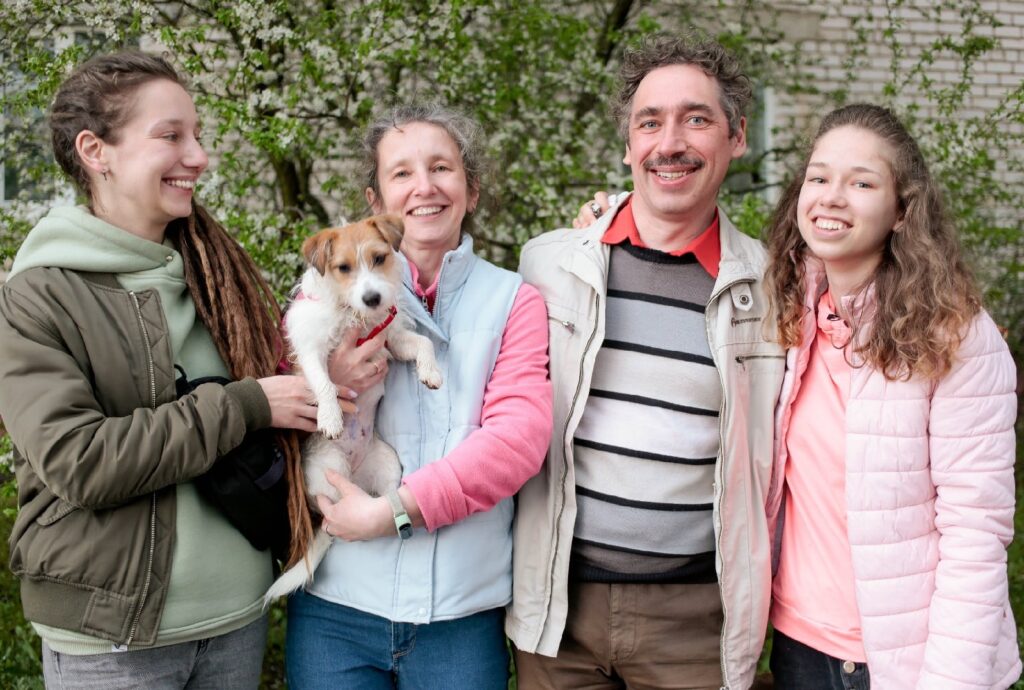 Alina with her family – photo credits: @fortunata_latushko
Alina with her family – photo credits: @fortunata_latushko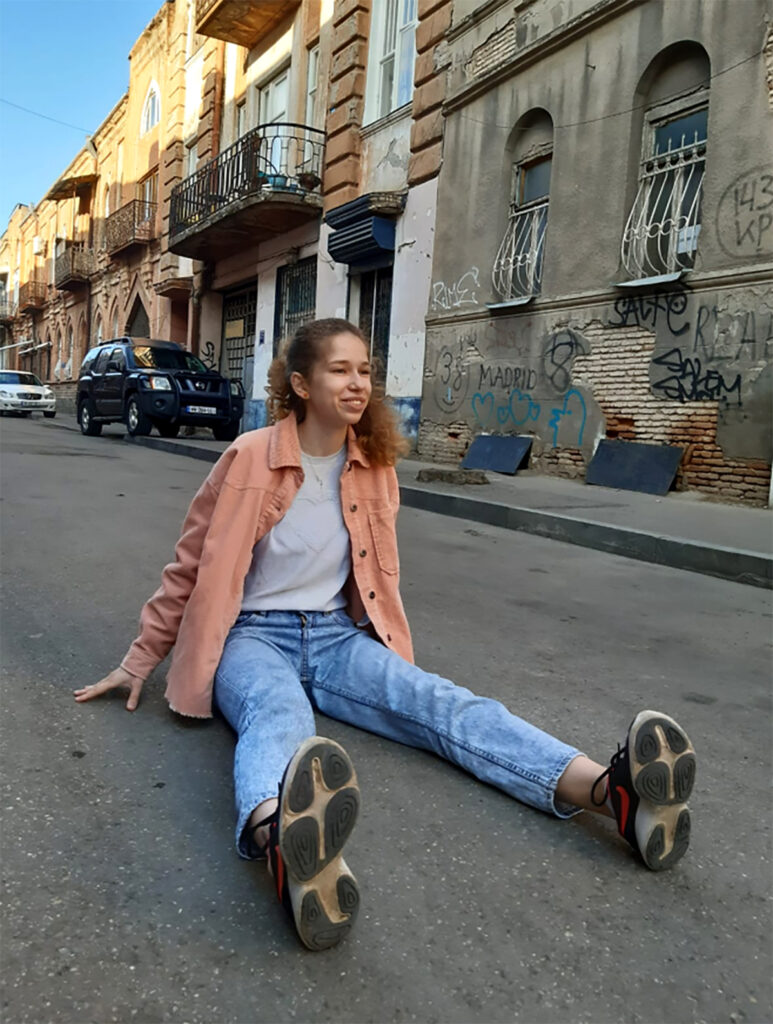 Alina in Tbilisi
Alina in Tbilisi
Alina applied to several other universities in the United States, and some of them were ready to accept her, but she felt the programmes offered there, the infrastructure and the quality of education, were not as attractive as New York.
In her final year at school in Tbilisi, there were many tests and exams, and there was no time left to search for alternative options. It was April 1. Alina was in Georgia, when she received a letter from NYU with congratulations and an offer of a scholarship that covered most of the costs of education, accommodation and meals on campus.
“Such conditions are rare for international students,” says Alina. “At NYU, scholarships are given only on the basis of an application, and not the financial situation of the family. Therefore, admission to this university means primarily years of hard work in the chosen discipline.”
In December, she got an answer with an offer of a place on the waiting list: “We could do nothing but wait.”
Now Alina is collecting documents for a visa and choosing subjects for the upcoming semester. Upon arrival in the United States, she will be vaccinated against COVID – all students will be vaccinated to prevent the further spread of the virus and ensure their safe stay on campus.
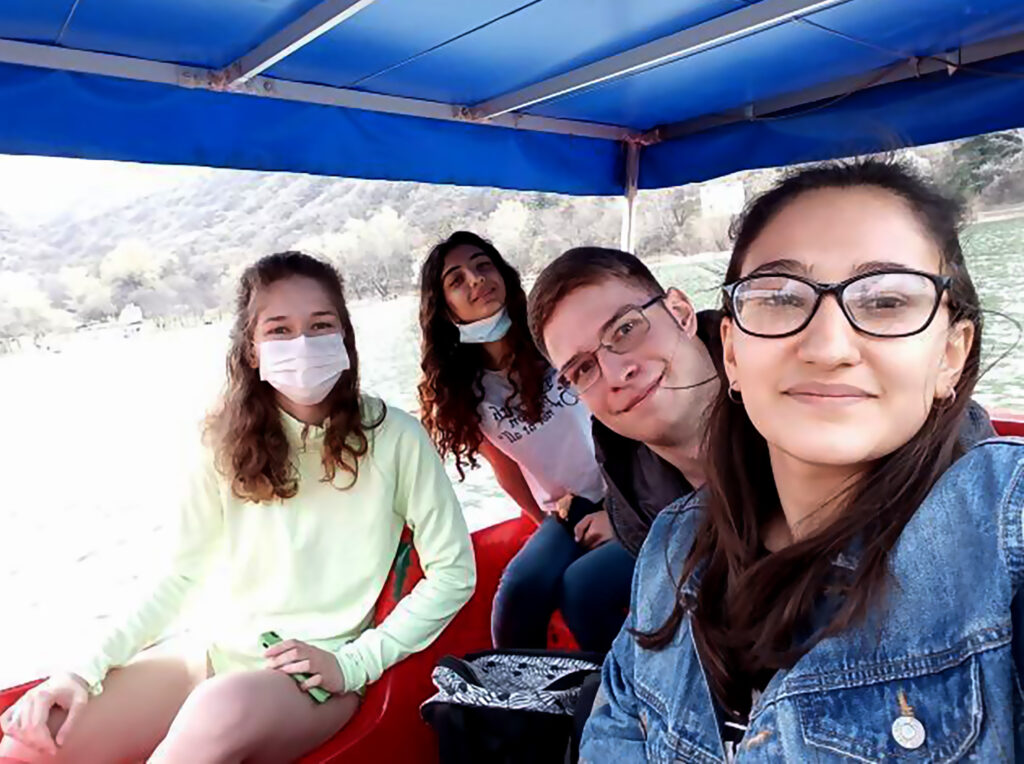 Alina during her studies in Tbilisi
Alina during her studies in Tbilisi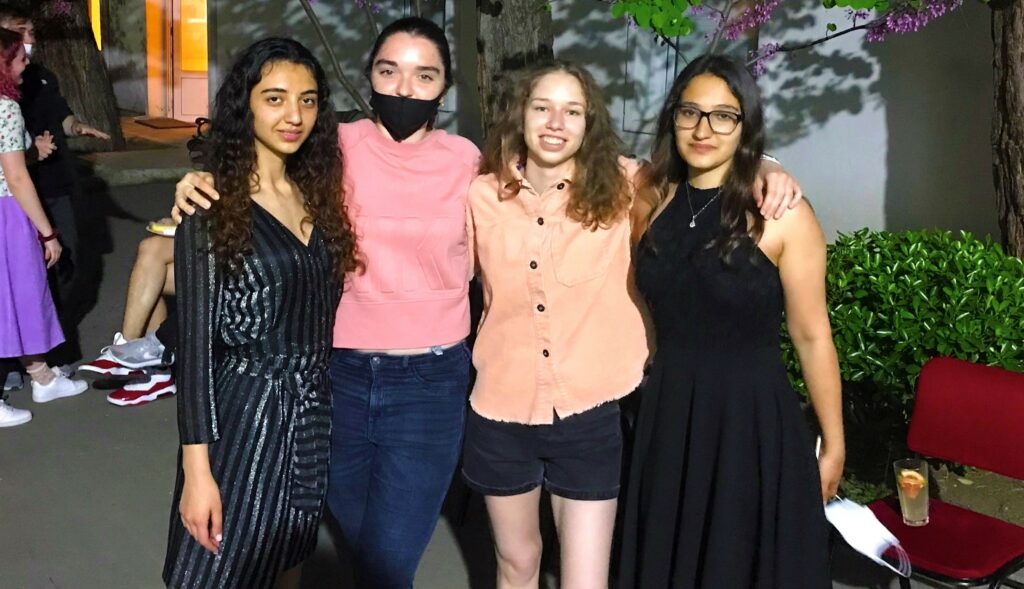 Alina with other students of the Tbilisi European School
Alina with other students of the Tbilisi European School
“I don’t like to have expectations. Something will anyhow look different from what I imagine. I did not adjust my life to a specific university, because I believe that first of all you need to do what you yourself are interested in. Admission to a chosen university is more of a bonus, as each of us follows our own unique life path and has our own definition of success,” says Alina Melnikava.
Whether she will return to Belarus “will depend on whether the opportunities for people engaged in arts will expand here.”
“In any case, I believe that I can make a greater contribution to the improvement of Belarus by investing in my education and subsequent opportunities to build a career in the art industry,” Alina concluded.
Author: Elena Spasyuk
This article was produced and published in Russian by Naviny.by
MOST READ
SEE ALSO

No, time is not on Russia‘s side
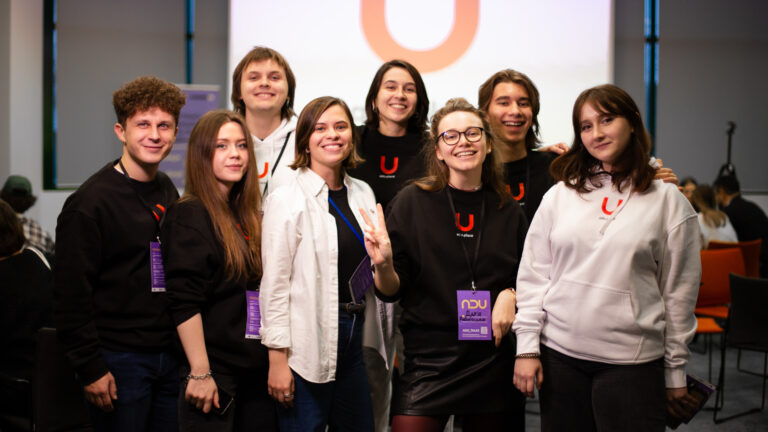
Great opportunities even if you have no money: what the EU offers Belarusian teachers and students

Be one step ahead of a hacker: check simple cybersecurity tips!

Rhisoma Lab: the intercultural hub for creatives in Tbilisi

How to act and move on: strategies for women facing discrimination and online harassment
More campaign pages:
Interested in the latest news and opportunities?
This website is managed by the EU-funded Regional Communication Programme for the Eastern Neighbourhood ('EU NEIGHBOURS east’), which complements and supports the communication of the Delegations of the European Union in the Eastern partner countries, and works under the guidance of the European Commission’s Directorate-General for Neighbourhood Policy and Enlargement Negotiations, and the European External Action Service. EU NEIGHBOURS east is implemented by a GOPA PACE-led consortium. It is part of the larger Neighbourhood Communication Programme (2020-2024) for the EU's Eastern and Southern Neighbourhood, which also includes 'EU NEIGHBOURS south’ project that runs the EU Neighbours portal.

The information on this site is subject to a Disclaimer and Protection of personal data. © European Union,







